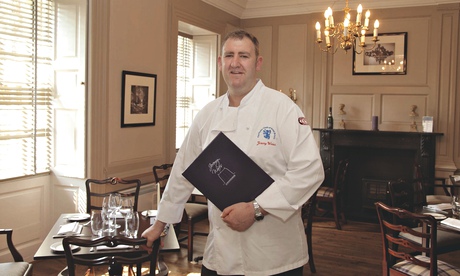
Jeremy Wares was working 80-hour weeks as a Michelin-starred chef – and thought feeling run down was par for the course. At 36, he didn’t even consider that a tremor in his hand was anything more serious than a trapped nerve. But after several weeks of tests, Wares was told he was one of a small percentage (around 1%) of Parkinson’s sufferers who develop the condition under the age of 40. “It came as a massive shock – I didn’t think that people my age ever got it. I had this horrible image that kept replaying in my head – it was me, unable to play rugby with my son, or at the school gates, in a wheelchair. It was as if my life had been taken away.”
Five years on from his diagnosis, Wares’s life is very different. He sold the restaurant he was running at the time, and didn’t know what to do next. Then he got a call from Macdonald Hotels & Resorts, which he had worked with on and off over the years. “They wanted me to work for them, but I said I couldn’t because I had Parkinson’s. ‘Mr Macdonald knows,’ I was told. I couldn’t believe it.”
Wares now oversees his restaurant at Macdonald Houstoun House in West Lothian, and is closely involved with Wobbly Williams, a tell-it-like-it-is website that raises funds for research and talks specifically – and with a sense of humour – to people living with early onset Parkinson’s.
“Parkinson’s took my life away, but gave me a new one back. My family was secondary to my work, but now they come first. I’ve been forced to slow down – but you have to work with Parkinson’s, not against it. I don’t think too far ahead, but for now, I’m playing rugby with my son, and I’m not in a wheelchair. Life is good.”
Danny Lavender shares Wares’s positivity. Diagnosed 10 years ago at the age of 41, he was thrown into a world of support groups full of people considerably older than him. “At 40, you’re likely to have kids – and you might be the breadwinner. A lot of families just can’t cope. And then there are the drugs. Obviously they offer a lifeline for sufferers, but some can cause impulsive and compulsive behaviours, such as gambling. This can have a huge impact on families, but it’s not talked about that much. I think patients need to take responsibility for their condition and maintain constant dialogue with their specialist nurse and consultant to find the right treatment for them. And it’s important for the family to be involved as it affects them equally – if not more.”
Professor Huw Morris, a Parkinson’s UK-funded researcher at University College London, explains that people with early-onset Parkinson’s respond well to medication but in time may develop drug related side-effects. “Recent developments in brain surgery have been very important in helping to manage these problems. Also, patients in the youngest age groups are more likely to have genetic forms of Parkinson’s and we hope that understanding these factors will help us to develop new treatments in the future, which will stop or slow progression.”
But Lavender feels lucky. “I’ve got good people around me – I feel supported and I look after myself with hard work, exercise and good nutrition. A sense of humour and a positive attitude are vital too – this is a neurological illness after all, and depression is a symptom.”
Sharon Martin, 44, developed depression after she was diagnosed five years ago. “I made the mistake of searching for “Parkinson’s” on Google images. Row upon row of shaky old people appeared. I was a single mum, with a nine-year-old son. How did any of this relate to me?”
Martin went into denial, working long hours in her job for a pharmaceutical company. “I hated Parkinson’s. It was like I had this ugly twin sister standing next to me all the time. I just wanted her to go away. Then I went to see a counsellor, who explained that she wasn’t going to. I had to grieve my old life, then start my new one.
“I met my new husband after I was diagnosed. We’d been dating and I said to him: ‘Do you want to know why I shake?’ He wasn’t fazed when I told him. He loves me for me; the disease doesn’t matter. We had an amazing wedding. That’s when I feel like my life restarted: my new life with Parkinson’s.
“Of course it’s not easy. I gave up work in February and moved from the Midlands back home to Wales to be closer to my family. I need their help now. I can’t drive any more for one thing and cooking is much harder – I keep cutting myself. But I’m completely open about my condition. I think if you are, people will be open back – especially when you’re younger like me. People don’t know what’s going on: you’re at the checkout and everyone’s thinking, why is she being so slow? I just turn around and say, ‘Give me a minute; I’ve got Parkinson’s.’ And then everyone helps out.’”
• Shake with laughter, a comedy night created by Rob Deering, takes place at The Comedy Store, London, on 13 October 2014 at 8pm. All funds go to Parkinson’s UK.

